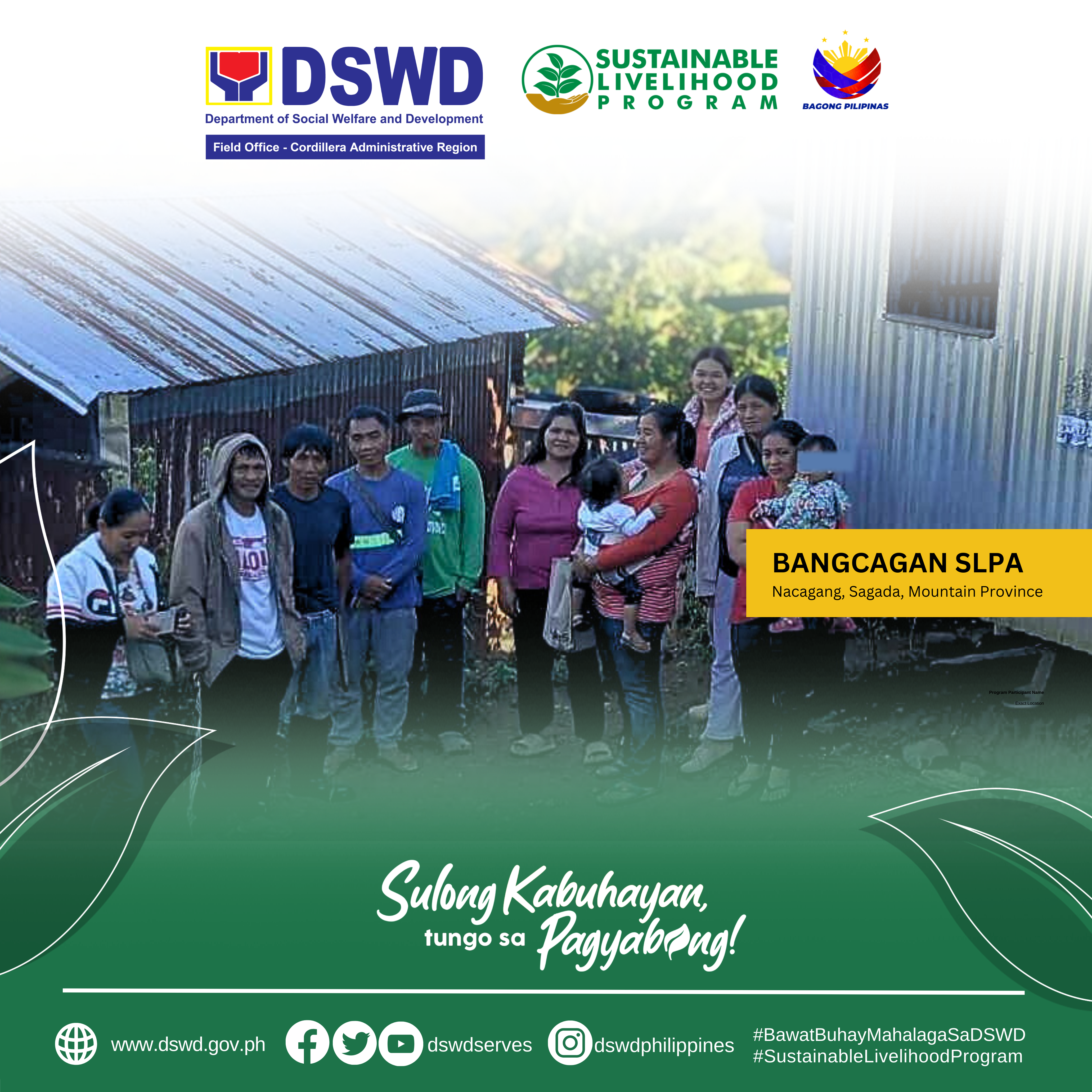
In the Municipality of Sagada in Mt. Province, lies the least populous village of Barangay Nacagang. This secluded haven, located 15 kilometers southwest from Central Sagada, is an agricultural land perfect for gardening and raising livestock, which became its people’s main source of income. However, being geographically isolated, the village rarely benefited from government programs.
The turning point came in 2018 when Barangay Nacagang was identified as a Conflict Vulnerable Area and became part of the PAyapa at MAsaganang PamayaNAn (PAMANA) program under the Sustainable Livelihood Program of the Department of Social Welfare and Development (DSWD). The Bangcagan Sustainable Livelihood Program Association (SLPA) was established and funded under the SLP-PAMANA, with swine raising identified as their key project.
In a region where traditional ways of farming and native pig raising prevailed, the PAMANA project introduced a revolutionary concept—the breeding of high-quality swine suitable for both rituals and commercial purposes. The barangay fully supported the project by establishing pig pens on one site away from the community to protect their livestock from any diseases. Uphold by the community’s customary beliefs, they performed a simple ritual to Kabunian asking for protection and blessing before they placed the swine into their pigpens. They did this because the it is the first time the high breed pigs introduced to the village.
The Bangcagan SLPA, governed by its Constitution and By-Laws, faced numerous challenges during its early stages. Lack of experience in raising high-breed pigs, limited access to resources due to local lockdowns, and the onset of African Swine Fever (ASF) tested the determination of the swine raisers.
During the onset of the African Swine Fever (ASF) in 2021, the community was not affected because of the strict implementation of the Bantay ASF Program jointly executed by the BLGU and the community. The BLGU assigned monitoring teams for the project and in compliance to the Waste Management and Environmental Ordinance of the Municipality, all hog raisers were required to build their pig pens away from the community.
While most of the pigs in Sagada are being culled due to the ASF, the swine of the PAMANA SLPA in Brgy. Nacagang is proliferating and the only safe supplier for live weight pork in the municipality. This is the time when the price of live weight inflated and during this time, the PAMANA hog raisers were able to gain an average PhP20,000-PhP50,000 quarterly.
Undeterred, the SLPA persevered, relying on the spirit of binnadang (helping each other) to overcome obstacles. The organization not only survived the ASF crisis but also became a lifeline for neighboring municipalities facing swine shortages.
As the ASF crisis subsided, the SLPA faced new challenges—the inflation of feed prices and a decrease in pork prices. Despite setbacks, the organization adapted and they supplemented the feeds with organic plants such as banana, camote and azola, sustaining their livelihood.
With a commitment to transparency, unity, and responsible management, the SLPA succeeded. Members diligently maintained general ledgers, adhered to environmental ordinances, and sought legal recognition, becoming registered with the Department of Labor and Employment (DOLE), accredited by the Sangguniang Bayan (SB), and acquiring registrations from the Bureau of Internal Revenue (BIR) and Civil Society Organization (CSO) Accreditation from the Department of Agriculture.
The members of Bangcagan SLPA expressed their utmost gratitude for the project because it opened different opportunities for them while they are making a profit from it. “Wada et nan magapuwan si pangiskwilan nan anan-ak me, wada et ilako me is pangkusina me si inagew ya wada py di poldiya me gapo sinan baboy ay inted di PAMANA” (We have [now] a source of income to financially support our children’s education, including our daily needs), they said during the interview. They also added that they have learned a lot from raising to reproduction of pigs. “Idwani, ado et nan income me, makailako kami et si ado ay baboy sunga wada et nan bassit bassit ay maur-urnong me kumpara id idi. Dake-dake ay iyaman isnan PAMANA ay programa,” (Currently, we have increased our income and we are able to sell more pigs and set aside more savings compared to before [the intervention of SLP-PAMANA]. We are very much grateful to the [SLP] PAMANA), all the members echoed.
PAMANA is a government program that aims to improve peacebuilding, reconstruction, and development in conflict-affected areas. It entails the Department of Social Welfare and Development (DSWD), the Office of the Presidential Adviser on the Peace Process (OPAPP), and local governments working together to ensure that communities receive improved delivery of basic social services from government institutions that are responsive, transparent, and accountable. #DSWD-CAR, Jezebel L. Gumatay, SLP Social Marketing Officer and Elizabeth Atiteo, Implementing Project Development Officer




